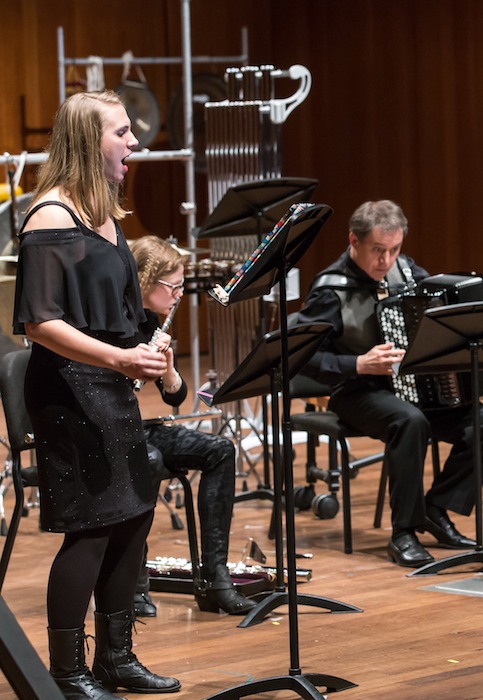Saariaho and Gubaidulina works stand out in Contempo program

Why is it that music of great contemporary composers always sound individual while music of not-so-good contemporary composers always sound alike?
Such were one’s thoughts at the Contempo program “Five from afar” heard Sunday at the Logan Center. Performed by Ensemble Dal Niente, the Kontras Quartet and other participating musicians, the University of Chicago Presents event offered works of five women composers.
Sandschleifen (sand-grinding) by Isabel Mundry opened the afternoon and lived up to its name. Scored for a quartet of percussion, piano and string trio, the German composer’s 2003 work is a virtual acidic wine sampler of decades-old “new music” cliches: scraping strings, scurrying figures, jagged fragments, etc. Conductor Michael Lewanski led Dal Niente members in an acute performance with finely graded contributions by percussionist John Corkill, yet the ultimate impression was one of emphatic, directionless urgency.
Except for a pause and the visual and aural confirmation that Chaya Czernowin’s String Quartet was a different work, one would have thought the Israeli composer’s 1995 piece was a continuation of the Mundry. This disconnected melange of bow tapping, violent pizzicatos, scratchy string passages, and fast, high figurations virtually defines the arid academic school that was played out by the 1970s. The Kontras Quartet delivered an intense performance but if playing this committed can’t make a case for the music, I’m not sure a case can be made. Czernowin was in attendance and managed to make it to the stage for a bow before the polite applause ended.
Fortunately, Kaija Saariaho’s music arrived to save the day. “Aer (Phoenix)” is the final section of her 1991 ballet Maa. The scoring brings together elements featured separately in the ballet’s preceding six sections with prerecorded electronics and live septet (flute, harp, percussion, piano doubling on harpsichord and string trio).
Maa has multiple meanings (“land” or “world”) and the ballet is equally abstract, with a sense of journey, crossing borders and going from one world to the next.
If the scenario is generalized, few composers can create and sustain as unique and compelling a sonic landscape as Saariaho. The Finnish composer’s pointillist, luminous writing was spare, unsettling and aurally fascinating in its restless, shimmering radiance. The electronic component swelled and ebbed in waves, with amorphous effects like creaking doors and footsteps. Under Lewanski’s lucid direction the Dal Niente musicians delivered a haunting and atmospheric performance with well-integrated electronics by Igor Santos.
Equally singular is the work of Sofia Gubaidulina, who was represented with her Galgenlieder (Gallows Songs) for 5. The Russian composer here crafts 14 vocal and instrumental pieces based upon Christian Morgenstern’s poetry, scored for voice, flute, bass, bayan and percussion.
Sunday’s performance presented seven excerpts. Kayleigh Butcher’s German pronunciation was not always idiomatic, but her light, flexible mezzo-soprano proved well-suited to this strange world. Butcher was technically secure in the spare, unadorned lines, conveying the varied expressive modes from piquant and charming (“Die Mitternachtsmaus”) to absurd (“Das Knie”) angry (“Das Fest des Wustlings”) and tragic and chilling (“Das Mondschaf”).
Gubaudulina’s instrumental scoring is consistently arresting in its delicate touches, from rustling percussion and solo bass to spare flute tones and faux-festive bayan. Lewanski led a balanced, transparent performance that brought out all of the weirdness and ingenuity.
In this context, the concluding music, Grazyna Bacewicz’s Piano Quintet No. 1, almost sounded like Rachmaninoff. This 1952 work by the pioneering Polish composer mixes bursts of nervous neoclassical energy with moody lyrical introspection–the somber threnody of the third movement is especially striking. The Kontras Quartet and pianist Pawel Checinski provided sturdy, committed advocacy with the bit of grain in the Kontras strings preventing things from getting too syrupy.
Contempo’s next concert takes place 3 p.m. April 23 with Third Coast Percussion at the Museum of Contemporary Art. The program includes Matthew Burtner’s Broken Drum, John Luther Adams’ Wail, Yu-Hui Chang’s Binge Delirium, John Cage’s Child of Tree, Morton Feldman’s King of Denmark, and Marta Ptaszynska’s Voice of the Winds for 100 percussionists. chicagopresents.uchicago.edu; 773-702-8068
Posted in Performances

